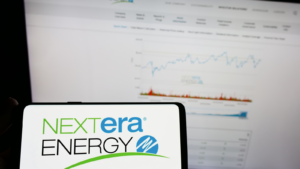I’m not just throwing this narrative from my imagination. Rather, a relatively recent Deloitte report noted that even with rising prices, American consumers are committed to their travel plans. This year, 48% of survey respondents stated that they plan to travel and stay in paid lodging. That’s about equivalent to statistics seen last year.
Even better for energy stocks, many tourists will take to the friendly skies. That should naturally boost airliner demand and that should ultimately benefit downstream hydrocarbon players. Also, green and renewable specialists should be on your radar as they support airport infrastructure.
With such a favorable backdrop, investors should keep close tabs on these energy stocks.
Exxon Mobil (XOM)

One of the biggest integrated oil and gas giants, Exxon Mobil (NYSE:XOM) stands among the supermajors. No matter what’s going on with the economy, so long as demand exists for hydrocarbons, XOM stock should benefit. That said, Exxon’s aviation fuel and lubricant products unit should see increased demand as Americans pack their bags.
To be fair, it’s been a tricky period for major oil firms. In the past four quarters, Exxon posted an average earnings per share of $2.19. Only one of the reports managed to beat the consensus view. However, the end result wasn’t too shabby, missing the collective consensus view of $2.20 by one cent. Also, the earnings surprise was only below parity by 0.48%.
Presently, XOM stock trades at a 1.43X premium to trailing revenue. That’s also not bad considering the average between Q1 2023 to Q1 2024 was 1.24X. Looking ahead, covering experts believe the top line may expand by 2.8% to $354.06 billion.
That doesn’t sound like much. However, the high-side estimate calls for $444.62 billion. That could be more realistic if travel demand sustains.
Shell (SHEL)

Another name among the biggest integrated energy stocks, Shell (NYSE:SHEL) covers multiple areas of the hydrocarbon value chain. As with Exxon Mobil, Shell is likely always going to be relevant to anything related to mobility. However, with Americans taking to the air, Shell’s aviation unit should see boosted sales. What’s more, Deloitte points out that several U.S. tourists intend to travel abroad.
In theory, that should help Shell, which is headquartered in London. Now, unlike Exxon, Shell has been a decidedly strong financial performer. In the past four quarters, its average EPS hit $1.98. That was well above the average consensus view of $1.77. This performance yielded an earnings surprise of just over 11%.
There is a premium associated with this print. Last year, SHEL averaged about 0.63X in terms of its sales multiple. Right now, the multiple stands at 0.81X. However, that is considered undervalued relative to the broader oil and gas industry.
For fiscal 2024, experts see modest growth in the top line of 2% to $323.05 billion. However, the most optimistic target calls for $443.5 billion. Thus, it’s one of the energy stocks to consider.
BP (BP)

Another London-based integrated oil giant, BP (NYSE:BP) brings another quality name to the table. Primarily, the company specializes in the production of natural gas and power. It also has invested in both onshore and offshore wind power. But it should benefit from sustained interest in travel, with BP carrying an aviation-focused business unit.
As stated above, quite a few Americans will travel abroad and it makes perfect sense to do so. While we are suffering from inflation, it’s worth noting that relative to several other currencies, the dollar is strong. That means relative when we go abroad, our greenbacks afford us enhanced purchasing power. I need to mention this because when it comes to financials, BP kinda, sorta stinks.
In the past four quarters, the company posted an average EPS of $1.02. It was supposed to hit $1.15, according to experts. So, why mention it among energy stocks tied to travel demand? Well, the sales multiple of 0.51X may be cheap.
If BP can rise to the upper end of the estimate spectrum (which stands at $247.74 billion), BP stock could be quite a deal.
Phillips 66 (PSX)

As a downstream specialist, Phillips 66 (NYSE:PSX) focuses on the component of the value chain involving refining and marketing. Basically, if it goes into your gas tank, it’s downstream. With that in mind, Phillips 66 actually offers a dual-pronged weapon for energy stocks tied to the travel sentiment surge.
First, the core business should steadily march higher. People will need to travel to the airport and that means extensive use of gasoline and diesel. Further, not every vacationer will take to the friendly skies. Many will go on road trips before the school season starts. That’s good for PSX stock.
Second, Phillips 66 offers an aviation fuel business unit. Thus, it may directly benefit from sustained travel demand. Financially, the company has been hit or miss for individual earnings reports. But overall, its average EPS in the past year was $3.37. That was noticeably above the expected print of $3.21.
Consensus wise, analysts see a 4% decline in fiscal 2024 sales to $143.99 billion. However, the most optimistic expert believes that $161.39 billion would be possible. If so, that would be a 12% lift.
Brookfield Renewable (BEPC)

I like to keep my life simple. Brookfield Renewable (NYSE:BEPC) is structured as a corporation rather than a limited partnership. You can still get the LP version but again, I like to keep my taxes as straightforward as humanly possible. Either way, the fundamentals are the same. Brookfield offers a range of renewable energy services. This framework could be broadly useful under the context of travel.
No, we’re a bit far away from flying airplanes based solely on solar power – though that’s a cool concept. Rather, I’m referring to the potential for the air travel industry to engage in partnerships with Brookfield. Earlier this year, the utility specialist’s parent company inked a deal with Microsoft (NASDAQ:MSFT) to develop wind and solar farms. I can see similar deals happening with air infrastructure entities.
Another factor that may help BEPC stock is the valuation argument. Right now, shares trade hands at 1.29X trailing-year sales. That’s much lower than the industry median stat of 2.32X.
By year’s end, analysts believe that Brookfield can ring up sales of $5.74 billion. That’s up 13.9% from the prior year. Also, sales can march up to $6.07 billion in the following year. It’s one of the alternative energy stocks to consider.
NextEra Energy (NEE)

Another player in the green and renewable energy sector, NextEra Energy (NYSE:NEE) falls under the regulated electric space of the utilities industry. In any circumstance, NextEra offers tremendous relevancies. However, as the travel sector sees increased demand and thus foot traffic, energy consumption will increase. That will almost surely put pressure on the broader infrastructure to support clean energy initiatives.
As with Brookfield’s parent company inking a deal with Microsoft, NextEra could see similar partnerships with travel-related enterprises. Further, as consumers become more educated regarding the impact of climate change, pressure may build on the entire emissions-producing ecosystem to mitigate their carbon footprint. Over the long run, that should be a positive for NEE stock.
To be fair, the company has gone through some turbulence in recent years. Still, over the past four quarters, NextEra’s average EPS landed at 81 cents. This figure beat the expected print of 74 cents.
Moving forward, the most optimistic expert sees a sales tally of $31.49 billion. Last year, sales reached $28.11 billion. For patient speculators, NEE should be on your radar of energy stocks to consider.
Gevo (GEVO)

By far the riskiest idea among energy stocks on this list, Gevo (NASDAQ:GEVO) is only for the most jaded gambler. I say that because the equity trades hands for well less than a buck. Yes, the law of small numbers means that a news item – even a small one – could skyrocket shares. It also means that the opposite is true. Bad news, even modestly not-favorable developments, could sink the valuation.
However, what’s intriguing here is Gevo’s development of sustainable aviation fuel. The concept of a green-forward fuel for the airliners might be some time away; hence, the poor performance of GEVO stock. Nevertheless, if progress inches forward, GEVO could potentially rocket higher. It’s high risk, high reward.
Now, even with the shoddy print in the charts, the company is only relatively undervalued. In the past year, the average sales multiple stood sat 84.5X. Right now, it’s down to 9.5X. Still, that’s much higher than its peers.
What speculators are looking forward to is fiscal 2025 sales. Following a 2024 that’s projected to be quite modest, the top line could hit $31.07 million. That’s well above 2023’s tally of $17.2 million.
On the date of publication, Josh Enomoto did not have (either directly or indirectly) any positions in the securities mentioned in this article. The opinions expressed in this article are those of the writer, subject to the InvestorPlace.com Publishing Guidelines.
On the date of publication, the responsible editor did not have (either directly or indirectly) any positions in the securities mentioned in this article.
A former senior business analyst for Sony Electronics, Josh Enomoto has helped broker major contracts with Fortune Global 500 companies. Over the past several years, he has delivered unique, critical insights for the investment markets, as well as various other industries including legal, construction management, and healthcare. Tweet him at @EnomotoMedia.
